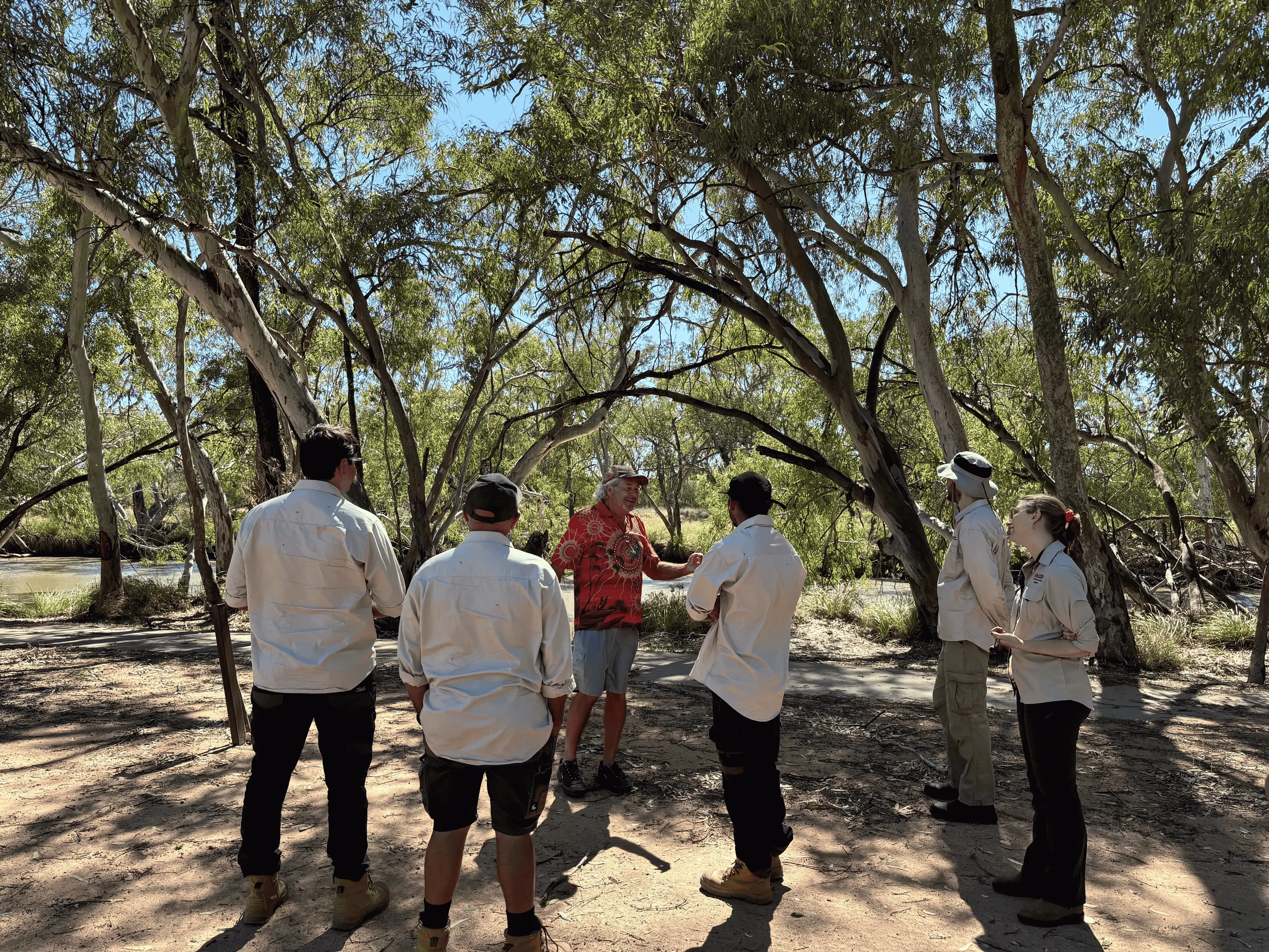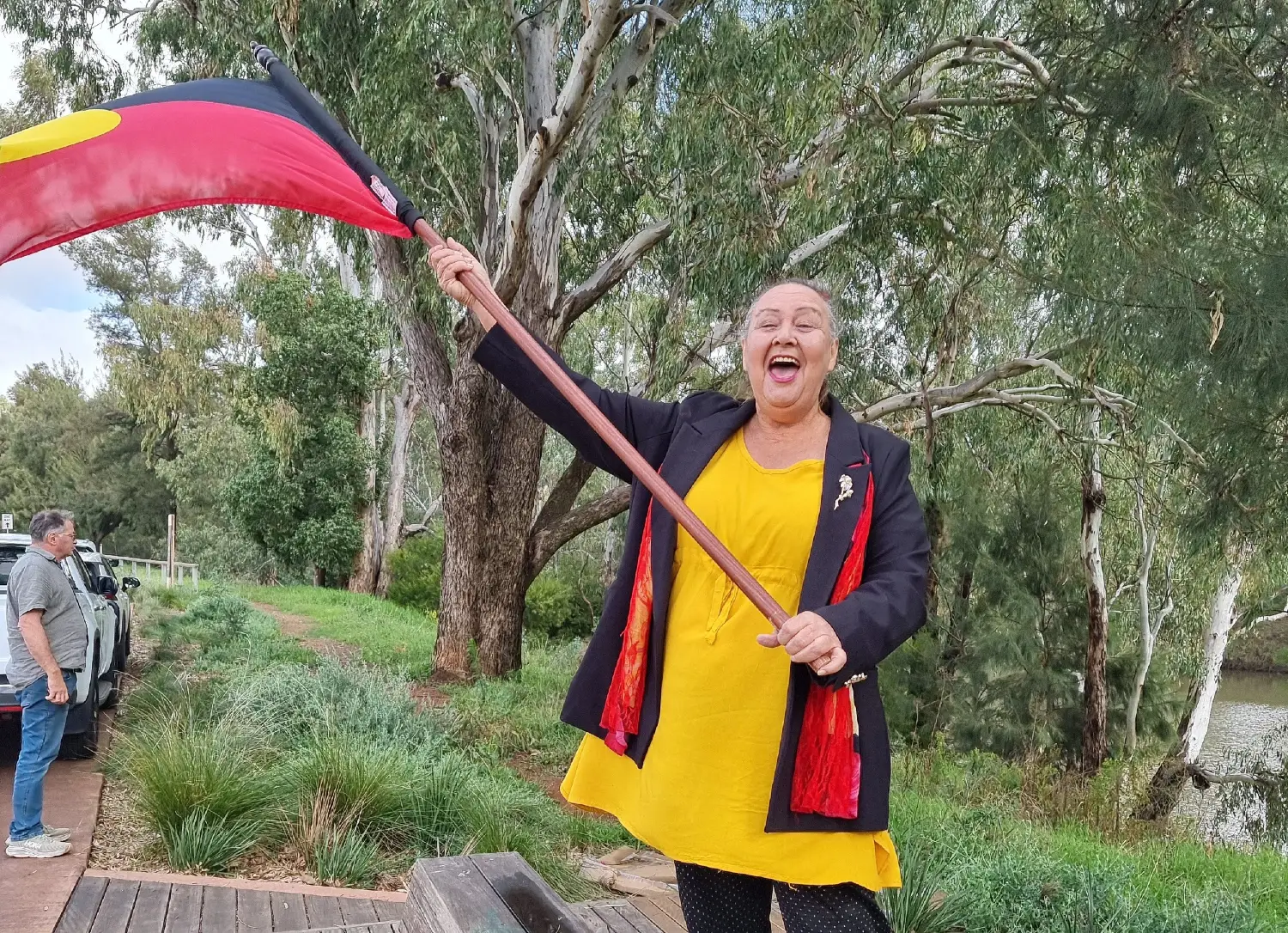First Nations Knowledge
and Science
Image: Students participate in 'Indigenous Ecology in Action' workshop run by the Lower Murray team. Credit: South Australian Research and Development Institute (SARDI)
Connection to Country
First Nations people have a deep and lasting connection to their lands and waters. Their knowledge and science developed and maintained over 65,000 years is crucial to caring for Country. Since European colonisation First Nations people have been excluded from managing and making decisions about their Country.
It is important we consider different knowledges to improve how we deliver water. We have listened to First Nations people we work with and understand that they need to be included in our monitoring, evaluation and research. Knowledges shared by First Nations people will help achieve better environmental outcomes.
We are building connections with First Nations people to understand how Flow MER can support First Nations people to care for their Country according to their lore and values. We have dedicated funding to support research and monitoring activities important to First Nations people.

Program Objectives
First Nations communities will determine how they want to be involved in monitoring, evaluation and research. We will work together to understand, support and deliver First Nations community aspirations in ways that they determine.
This will be supported through:
Building long-term relationships and partnerships between First Nations people and Flow-MER practitioners
Strong, respectful, and lasting relationships support understanding how First Nations people would like their knowledges and science to be included in the program. Building relationships creates opportunities to connect and share knowledge in ways determined by First Nations people.
Recognising, valuing, and protecting the use of First Nations people’s knowledges in Flow-MER
We will respect Indigenous cultural and intellectual property, data rights, and governance. First Nations people will determine if and how they would like to share their knowledge, science and ideas to support monitoring, evaluation, and research activities.
Promoting First Nations people’s leadership and decision-making
First Nations people will take the lead and make decisions about their involvement in the program and how their knowledges and science is shared. Their knowledge and science is important for understanding how we better manage water for the environment.

Our Approach
Each project will explore with First Nations communities how they want to be involved, and how the program can support their knowledges and science. We are supporting First Nations knowledges and science in the following ways:
Building connections with First Nations communities
Each area has a cultural advisor to build connections between the program and First Nations people. This will help us to understand how First Nations people would like to be involved in the program and if they would like to share their knowledges and science as part of the program.
Funding for First Nations monitoring, evaluation and research
Each project has dedicated funding for monitoring, evaluation and research activities that are important to First Nations communities. This funding also supports employment of cultural advisors to work towards Indigenous led monitoring, evaluation and research. The approach to appointing cultural advisors will be different across each area to support the diversity of First Nations cultures, community and Country.
Inclusion of a Cultural Outcomes theme
First Nations communities can contribute to all themes: River Flows and Connectivity, Native Vegetation, Waterbirds, Native Fish, and Cultural Outcomes. A Cultural Outcomes Theme was added to the Flow-MER Program in 2024. It provides an opportunity for First Nations people to identify cultural outcomes linked to environmental watering. Each area will have a cultural outcomes theme lead to support Indigenous leadership in decision making in the program.
Establishment of a Cultural Network to share knowledge and influence the Program
A Cultural Network has been established for First Nations people working across the Flow-MER Program to connect, share knowledge and influence the Program. The Cultural Network is part of the Program governance along with other working groups.
Principle 1: Recognise and support each community's right to make their own decisions.
Principle 2: Build and maintain strong relationships based on trust and respect.
Principle 3: Listen to diverse voices in planning, decision-making and delivery.
Principle 4: Provide a culturally safe space and respect cultural protocols.
Principle 5: Be open and realistic about what is achievable.
First Nations Stories
News

Sharing Cultural knowledge from St George to Narran Lakes
A Flow-MER knowledge exchange journey from St George to Narran Lakes brought Rangers and water managers together with Elders to share cultural knowledge, learn from Country and strengthen understanding of environmental water outcomes.
Our Team
One Basin CRC has been engaged by the CEWH to support First Nations MER across the Flow-MER Program.
One Basin CRC

Partners
.jpg)
Alluvium Consulting





